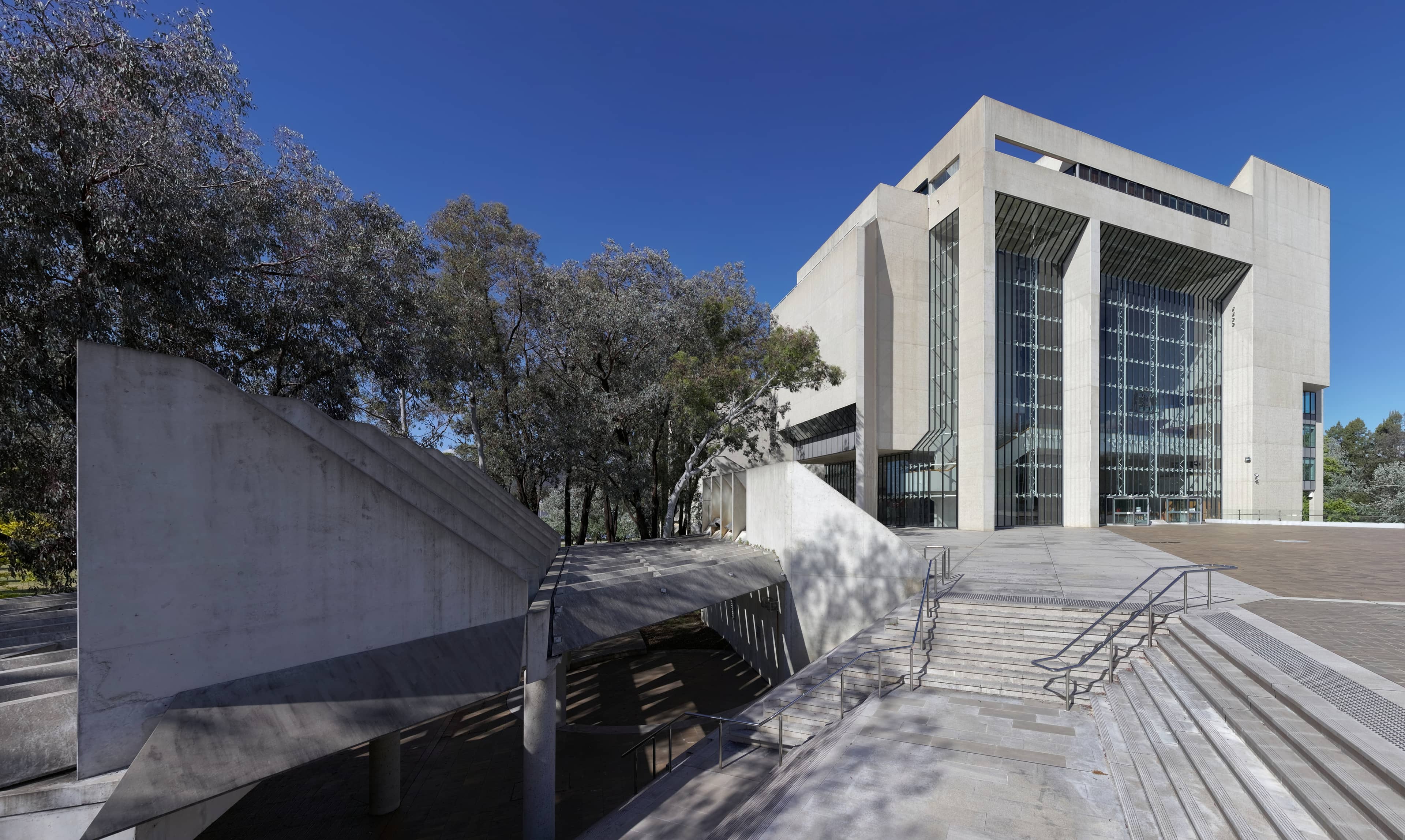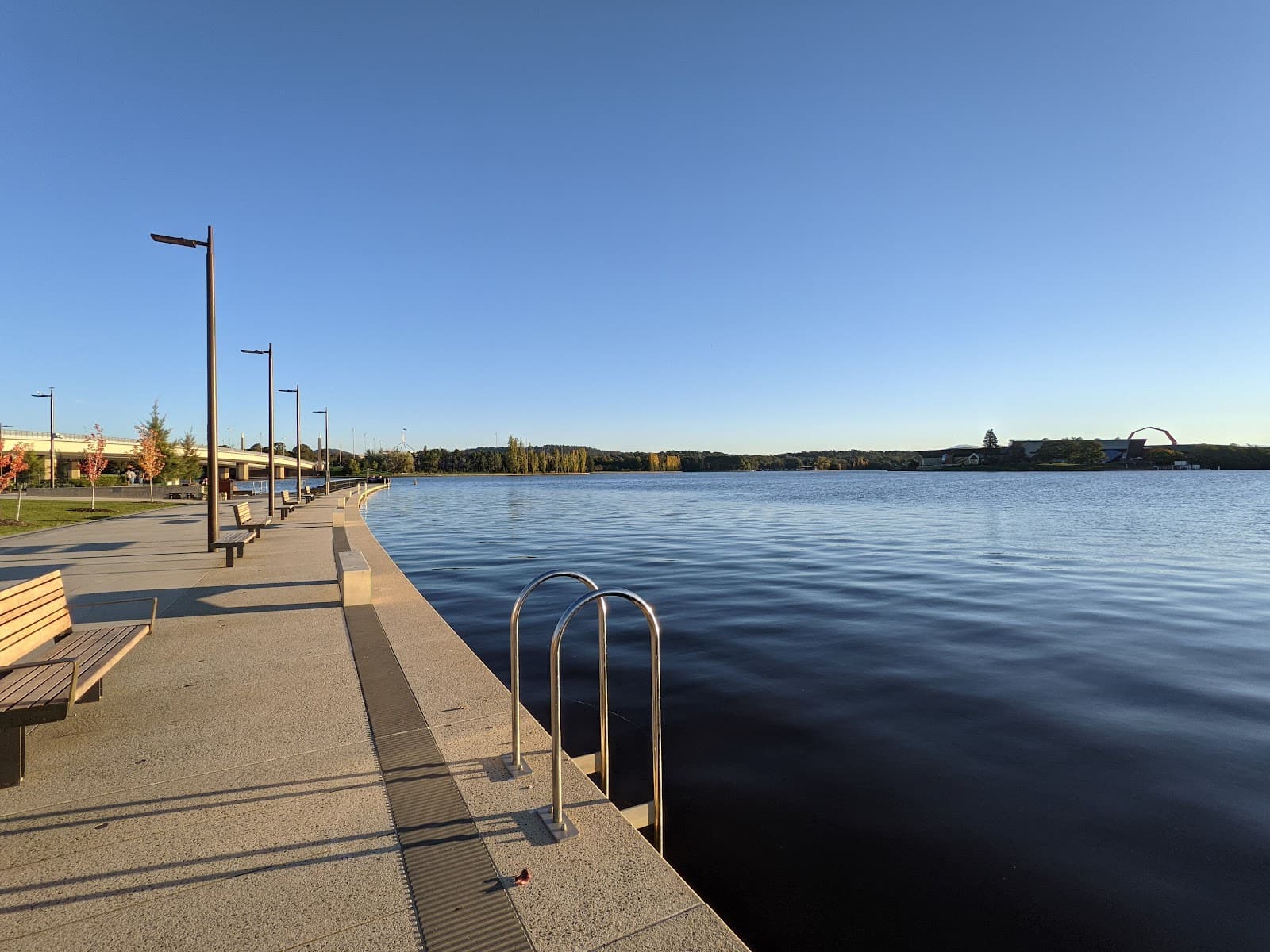
High Court of Australia
Monumental Brutalist architecture housing Australia's highest court, blending imposing design with a warm art-filled interior.

Highlights
Must-see attractions

Social
From TikTok & Reddit
Best Time
Chance to see court in session

High Court of Australia
Best Time
Chance to see court in session

Highlights
Must-see attractions
Monumental Brutalist architecture housing Australia's highest court, blending imposing design with a warm art-filled interior.
"A compelling mix of national significance and striking design—well worth a stop for visitors interested in law, architecture, or civic institutions."

Check Sitting Schedule
Confirm court sitting dates online for a chance to witness proceedings. :calendar:
Embrace the Architecture
Appreciate the Brutalist design; it's a key feature! :camerawithflash:

Highlights
Discover the most iconic attractions and experiences

Courtroom Observation
Courtrooms
Witness Australia's highest court in action. A truly unique experience to see justice being served.

Brutalist Architecture
Exterior and Interior
Marvel at the monumental concrete and glass design, a striking example of Brutalist architecture.

Art Collection
Public Galleries
Admire the impressive art adorning the walls, adding warmth and storytelling to the grand space.
Plans like a pro.
Thinks like you
Planning Your Visit
Timing Your Visit
Navigating the Building
Best Times
Insider Tips
from TikTok, Instagram & Reddit
Check Sitting Schedule
Confirm court sitting dates online for a chance to witness proceedings. :calendar:
Embrace the Architecture
Appreciate the Brutalist design; it's a key feature! :camerawithflash:
Security First
Be prepared for security checks upon entry. :shield:
Explore the Art
Don't miss the significant artworks displayed throughout the building. :frame_photo:
Tips
from all over the internet
Check Sitting Schedule
Confirm court sitting dates online for a chance to witness proceedings. :calendar:
Embrace the Architecture
Appreciate the Brutalist design; it's a key feature! :camerawithflash:
Security First
Be prepared for security checks upon entry. :shield:
Explore the Art
Don't miss the significant artworks displayed throughout the building. :frame_photo:
What Travellers Say
Reviews Summary
Visitors praise the High Court of Australia for its striking Brutalist architecture, often noting a surprising warmth within due to its impressive art collection. The opportunity to witness court proceedings is a highlight, offering a unique insight into Australia's judicial system. While the building's scale is monumental, the art and informative displays make it an engaging visit for those interested in law, history, or architecture.
"Brutalist architecture but a charming warmth within.
The art adorning the walls of this impressive building by the lake softens what might be wrongly perceived as a sterile building.
I have visited this highest court in the land three or four times since it opened in 1980 and this huge monolith only gets better with age :-)
After the tour we were lucky enough to be able to sit in on a court in session. Listening to these adjudications certainly adds to the overall visit.
Always a fascinating place to visit when in Canberra!
Here are some photos..."
Leanne White
"Impressive national landmark blending Brutalist architecture with open access to Australia’s highest court.
The High Court of Australia is a bold example of Brutalist architecture, with imposing concrete and glass forms balanced by soaring, light-filled interiors. Public areas are open Monday to Friday 9:45 AM–4:30 PM and Sundays 12:00 PM–4:00 PM, with the chance to observe hearings during sitting weeks. Even outside sessions, informative displays provide insight into the Court’s role and history. Accessibility is excellent with ramps, lifts, and clear signage. Security is smooth and efficient, while parking is available nearby in the Parliamentary Zone, though often busy on weekdays.
A compelling mix of national significance and striking design—well worth a stop for visitors interested in law, architecture, or civic institutions."
Robert Somerville
"The tour guides and security staff did their job really well. This Brutalist Building from outside and inside, has symbolism in every element. The ramps are really huge and occupy the main circulation of the building which gives opportunity to glance at the beautiful paintings that all have a story behind. The architect, Christopher Kringas, did his job right !"
Ishpreet Kaur
What People Like
What People Dislike
Frequently Asked Questions
🚇 🗺️ Getting There
The High Court is located in Canberra, ACT. It's easily accessible by car, with parking available in the Parliamentary Zone. Public transport options are also available, though direct routes may vary. It's a prominent landmark near Lake Burley Griffin, making it hard to miss.
Yes, there is parking available nearby in the Parliamentary Zone. However, it can get quite busy, especially on weekdays when the court is in session. Arriving early is recommended if you plan to drive.
Absolutely! The High Court is part of the Parliamentary Triangle, making it a pleasant walk from other key sites like Parliament House and the National Gallery of Australia. Enjoy the scenic surroundings of Lake Burley Griffin.
🎫 🎫 Tickets & Entry
No, general admission to the public areas of the High Court of Australia is free. You can explore the building and its public galleries without a ticket.
Public areas are typically open Monday to Friday from 9:45 AM to 4:30 PM, and on Sundays from 12:00 PM to 4:00 PM. It's always best to check their official website for the most current hours, especially around public holidays.
Yes, you can observe court proceedings during sitting weeks. It's advisable to check the court's schedule online beforehand. Be aware that seating may be limited and there are rules of conduct to follow.
While there isn't a strict dress code for general visitors, it's respectful to dress neatly, especially if you plan to observe a court session. Avoid overly casual attire.
The High Court offers guided tours, often led by knowledgeable staff or volunteers. These tours provide excellent insights into the building's history, architecture, and the court's function. Check their website for tour times and booking information.
🎫 🏛️ Onsite Experience
The High Court is a prime example of Brutalist architecture, characterized by its monumental concrete and glass forms. Reviewers often note its imposing exterior contrasted with a surprisingly warm and art-filled interior.
Inside, you can explore the public galleries, admire the extensive art collection adorning the walls, and learn about the court's role through informative displays. If the court is in session, you can observe proceedings.
Yes, the building is designed with accessibility in mind, featuring ramps, lifts, and clear signage throughout. It aims to be welcoming to all visitors.
It is the highest court in the Australian judicial system, responsible for interpreting and applying the laws of Australia. It plays a crucial role in the nation's democracy and legal framework.
Photography is generally permitted in public areas for personal use, but restrictions may apply in courtrooms, especially during proceedings. It's best to check signage or ask staff if you're unsure.
🎫 🖼️ Art & History
The current building was opened in 1980 and is a significant example of Brutalist architecture designed by Christopher Kringas. It was built to house Australia's highest court and has become an iconic national landmark.
The walls are adorned with a significant collection of Australian art, including paintings and other works. These pieces often have stories behind them and contribute to the building's unique atmosphere.
Informative displays within the public areas provide insights into the Court's function, its landmark cases, and its importance in shaping Australian law and democracy.
For Different Travelers
Tailored advice for your travel style
Architecture Enthusiasts
Don't miss the opportunity to explore the public galleries and appreciate how the art collection complements the stark architectural lines. The building itself tells a story of national significance and judicial power, making it a fascinating study for anyone interested in the intersection of design and civic function.
Law and History Buffs
Understanding the history of the High Court of Australia and its function is key to grasping the country's legal framework. The building's architecture also reflects its importance, and the art collection often carries historical or symbolic weight, adding further layers of context to your visit.
Deep Dives
In-depth insights and expert knowledge
Architectural Marvel: Brutalism Meets Warmth
Reviewers frequently highlight this juxtaposition, noting how the art collection, combined with the soaring, light-filled interiors, creates a more welcoming and engaging atmosphere than one might expect from a Brutalist structure. The building's design is not just about aesthetics; it's intended to reflect the transparency and significance of Australia's highest judicial institution. The sheer scale and symbolism embedded in every element make it a fascinating subject for anyone interested in architecture or national landmarks.
Experiencing Justice: Courtroom Sessions and Legal Insights
Even outside of sitting periods, the High Court provides ample opportunities to learn about its crucial role. Informative displays are strategically placed throughout the public areas, detailing landmark legal cases that have shaped the nation, the court's constitutional responsibilities, and the broader context of Australian law. These exhibits, combined with the architectural and artistic elements, create a comprehensive educational experience for visitors interested in law, history, or civic institutions.




Social
from TikTok, Instagram & Reddit